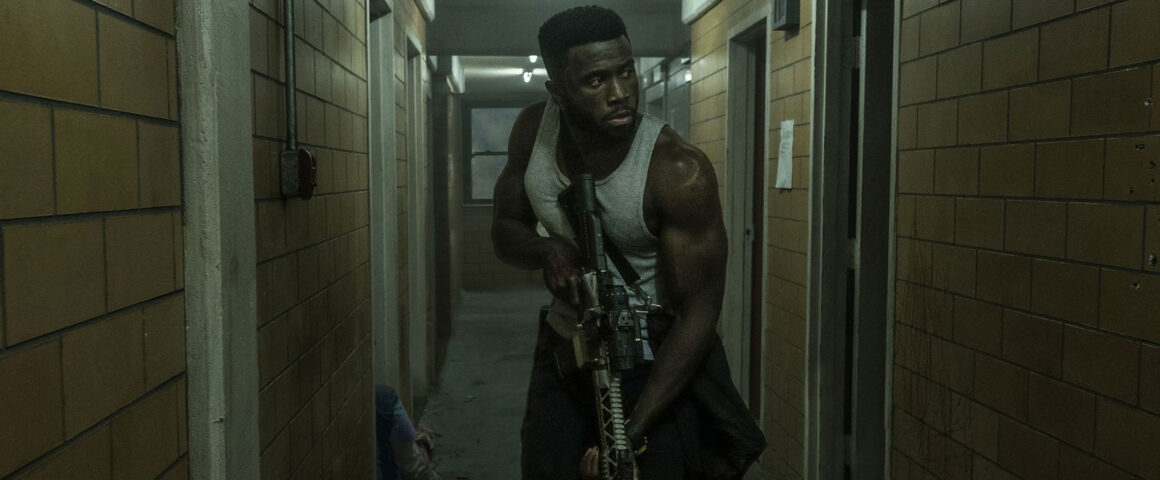“Are you an angry person?”
“Who are you angry at?”
“Are you ever inclined to hurt someone?”
The First Purge begins on Staten Island, where evaluation teams interview prospective participants in a new experiment organized by the New Founding Fathers of America (NFFA), a political party organized as an alternative to the existing system. On television, the newly-elected NFFA president announces “the American Dream is dead” and a new world has come upon us. Trailers appear in low-income neighborhoods and housing projects, targeting those who could really use the $5,000 compensation for staying on the island during the experiment in which law and order is paused for a 12 hour period. They are also told, in no uncertain terms, that additional compensation would be provided for active participation. Protesters converge, led by Nya (Lex Scott Davis, “SuperFly”), urging people to stay home and protect each other. Drug kingpin Dmitri (Y’lan Noel, “Insecure” TV series) holds a similar view — forbidding his crew to participate and orders them to protect their turf, their people, and their product. He calls Nya and offers to protect her and her brother Isaiah (Joivan Wade, “The Weekend Movie”), but Nya declines, choosing instead to support her community by holing up in a local church with her neighbors.
When the experiment begins, Chief of Staff Arlo Sabian (Patch Darragh, “Sully”) and the psychologist responsible for the idea, Dr. Updale (Marisa Tomei, “Spider-Man: Homecoming”), watch “The Purge” unfurl from monitoring screens in a high rise. Each participant is given recording contact lenses that glow blue, red, green, and amber and add an eerie ghostlike element to those roaming the streets after the haunting warning sirens sound. Their footage is carefully monitored and supplemented by a team of drones buzzing through the sky. At first, participants only loot stores and attempt to break down ATMs, while others hold block parties and maintain safety in numbers.
After footage of the first murder is aired on television, however, chaos breaks out. Dmitri, Nya, and their community discover mercenaries have been released into Staten Island to ensure the experiment is a groundbreaking success, and they quickly realize their participation is no longer optional.
Directed by Gerald McMurray and written by James DeMonaco (the writer/director of the previous three “Purge” films), The First Purge veers away from its horror genre roots and feels more like a political action-thriller. With teaser posters parodying the infamous “Make America Great” baseball caps, The First Purge makes it very clear it isn’t going to pull any punches on the current political climate. There is a very strong “us vs. them” tone to the film, made stronger by excitable Purgers who choose to wear police helmets and sunglasses and by mercenaries who overflow pickup truck beds while wearing KKK hoods.
The main characters, though relatively nondescript, passionately love their neighborhood and their community, and will stop at nothing to protect and avenge each other. The everyday struggles of these communities are touched upon through Isaiah’s and Nya’s struggles to stay afloat financially, and through their shared exasperation at apartments that are not properly maintained by the building’s superintendent. Unbeknownst to his sister, Isaiah works with one of Dmitri’s men for the day and is violently accosted by addict Skeletor (Rotimi Paul, “Dutch Kills”), who begins the film expressing his deep desire for a way to release his anger. When the experiment officially begins, Isaiah searches for his revenge, Nya fights fiercely to keep her loved ones safe, and Dmitri, an ex-boyfriend, roams the streets with his crew, doing what he can to maintain order.
While the earlier installments focused on the inherent terror of home invasion (“The Purge”) and getting caught unprotected in the streets (“The Purge: Anarchy”), The First Purge follows “The Purge: Election Year” with its political machining. It serves as a staunch warning for society to be wary of “ultimate solutions” to the problems facing the nation. The true horror of these films is a creeping suspicion that fictionalized tales such as this, “The Handmaid’s Tale” TV series, and others are closer to reality than we’d like to admit.
Dr. Updale insists to a reporter that the experiment is a psychological conceit, not a political one, yet she is quickly shown her mistakes by Chief of Staff Sabian. Conversely, and firmly, however, the overarching message of The First Purge is clearly expressed through Nya’s stout words to Dmitri: “We gotta make choices in life — to heal or to hurt.”



